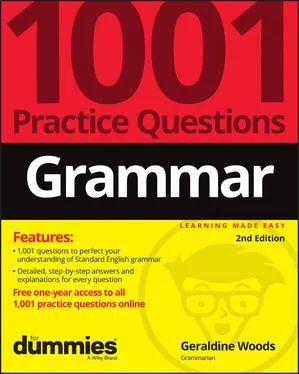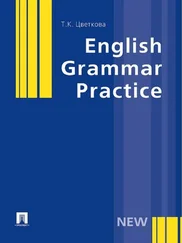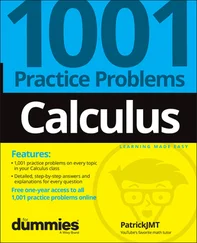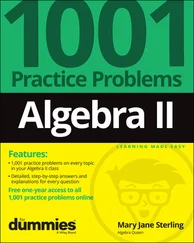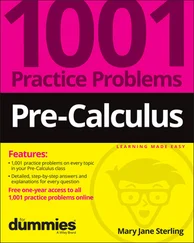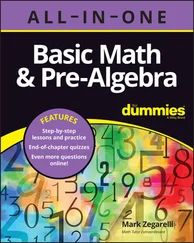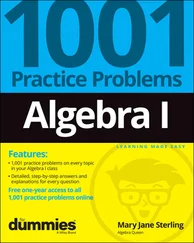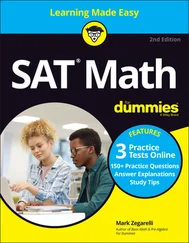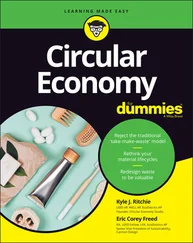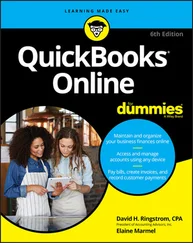57. Perhaps because the president _____ (to campaign) for the mayor, the mayor won by a huge margin.
58. Linda _____ (to enter) the cafeteria and sits next to the most hated teacher in the entire school!
59. The orchestra _____ (to insure) the instruments every year, so no one ever worries about storm damage after the hurricane.
60. Last year I traveled to Europe, but next year I _____ (to tour) Asia.
61. In response to the reporter’s question, the zookeeper said that the lion _____ (to be) very friendly.
62. Morty declared that eight added to ten _____ (to equal) eighteen.
63. Arthur told me that he _____ (to need) a loan until payday and asked me to give him $10.
64. Shana reported that at the end of every show, the ballet dancers _____ (to bow) and ignored the boos from the audience.
65. The astronomer told the youngsters that the earth _____ (to revolve) around the sun.
Chapter 2
Working with Irregular, Helping, and Descriptive Verb Forms
Life would be boring if everything followed the same pattern, wouldn't it? A little variety can pep up your day. It can also ruin your day if the variation is an irregular verb — and the English language has many. Not to worry: In this chapter you practice selecting irregular verbs, changing meaning with helping verbs ( should, can, may, do, does, did, and the like), and employing verb forms that can act as descriptions, which grammarians call participles and infinitives and the rest of us call “pains in the neck.”
The Questions You’ll Work On
In this chapter, you work on questions that develop these skills:
Using irregular past-tense and participle forms correctly
Selecting the proper form and tense of the irregular verbs to be and to have
Adding shades of meaning with the helping verbs should, must, can, could, may, might, and would
Creating questions with helping verbs
Identifying participles functioning as descriptions
Choosing the best form of participles and infinitives used as descriptions
Keep these points in mind when you answer the questions in this chapter:
Check whether the past-tense form or participle is regular or irregular.
Choose the correct tense of irregular verbs based on the meaning of the sentence.
Employ reading comprehension skills to detect the need for a helping verb expressing obligation, possibility, condition, or ability.
Rearrange word order and add helping verbs to create questions.
Select present participles or infinitives as descriptions for actions in the past, present, or future.
66–90 Choose the proper past, present perfect, past perfect, or future perfect form of the irregular verb in parentheses so that the verb fits the meaning of the sentence.
66. Joe _____ (to catch) the ball as it reached the top of the outfield fence.
67. The car was cruising along the highway smoothly until it _____ (to hit) a huge bump.
68. Dorothy and the baby _____ (to sleep) for two hours when they returned from a visit to Grandma.
69. At the end of the trial, Judge Ann Marie Smith _____ (to rise) from her chair and left the courtroom.
70. Last week, the Yankees _____ (to beat) their fiercest rivals.
71. From 2010 through 2011, the confused clerk _____ (to put) all the forms in the wrong file cabinet.
72. The helicopter _____ (to fly) straight up into the sky and then headed south.
73. George _____ (to see) Miss Duke, his little dog, and grabbed her before she could run away again.
74. I didn’t know that you _____ (to swim) in the deep water last summer; I thought you were less advanced in your swimming skills.
75. Nelson wouldn’t _____ (to get) sick if he had washed his hands more frequently.
76. The bully approached, but because my uncle _____ (to teach) me how to handle difficult people, I wasn’t afraid.
77. The doctor _____ (to do) everything in his power; now Allison must wait for the medicine to take effect.
78. Miriam _____ (to let) the dogs out for a few minutes, but she will call them inside soon.
79. Although Adam _____ (to find) a good candidate already, the boss continued to interview others for the job.
80. “Who _____ (to begin) the fight, you or your brother?” asked Mother as she separated her battling children.
81. After you _____ (to send) the letter, shred the scrap copies.
82. At first, the rain was simply annoying, but when it _____ (to freeze), the streets became very slippery, and many pedestrians fell.
83. Albert _____ (to tear) his shirt when he crawled through the obstacle course.
84. “I _____ (to know) it!” exclaimed the detective as the murderer confessed.
85. When she attempted to pay for her coffee, Lee discovered that she _____ (to lose) all her coins because of a small hole in her pocket.
86. By midnight Angie _____ (to sing) that aria enough times to set a world record.
87. In ancient times, murderers were often _____ (to hang) in the public square.
88. The picture _____ (to hang) on the wall for years, but no one noticed it.
89. The janitor _____ (to sweep) the sidewalk before the students arrive, so expect a clean path.
90. The soldiers _____ (to lay) down their weapons but are ready to resume target practice at a moment’s notice.
Dealing with To Be and To Have
91–105Select the proper form of the verb to be or to have to fit the meaning of the sentence.
91. The marble statue _____ (to be) on the shelf right now, but earlier it was in the sculptor’s studio.
92. Along with Jack, I _____ (to be) bored and decided to watch a different show.
93. The co-presidents _____ (to have) no trouble persuading club members to go out for pizza when they suggest the excursion at the end of the meeting because everyone will be hungry then.
94. Louisa rejected the sofa when it was delivered because it _____ (to have) a stain on one cushion.
95. Max _____ (to be) sick for the last two days, but the doctor predicts that his temperature will be normal tomorrow.
96. The lottery winners _____ (to be) difficult; they refuse to share their winnings.
97. If the referee and the coach can’t agree, our efforts _____ (to be) fruitless because we will forfeit the game.
98. Shelley _____ (to have) difficulty getting up on time ever since her alarm clock broke, but she plans to buy a new one soon.
99. While the elevators were rising, the mechanic _____ (to have) doubts about the strange noises below.
100. We _____ (to be) here, patiently waiting, for more than four hours before Justin arrived.
101. When Doreen _____ (to be) 23, she struggled to start her business, but one day, sales began to rise.
102. By the time it opens on Broadway, the show _____ (to have) four different directors.
103. Dolores, who _____ (to be) your friend, begs you to forgive her.
104. Doug, who _____ (to be) very immature in those days, used to stick gum under everyone’s desk.
105. Sam thought that his mom _____ (to have) a stroke, but fortunately, he was wrong; it was just a headache.
Adding Meaning with Helping Verbs
106–120 Choose the verb form that expresses the tense of the verb and the shade of meaning shown in parentheses.
106. Shelly’s song _____ (to win, present tense, ability) her an award for “Best New Artist.”
107. Alice _____ (to fly, future, possibility) to Buenos Aires on business next week.
Читать дальше
